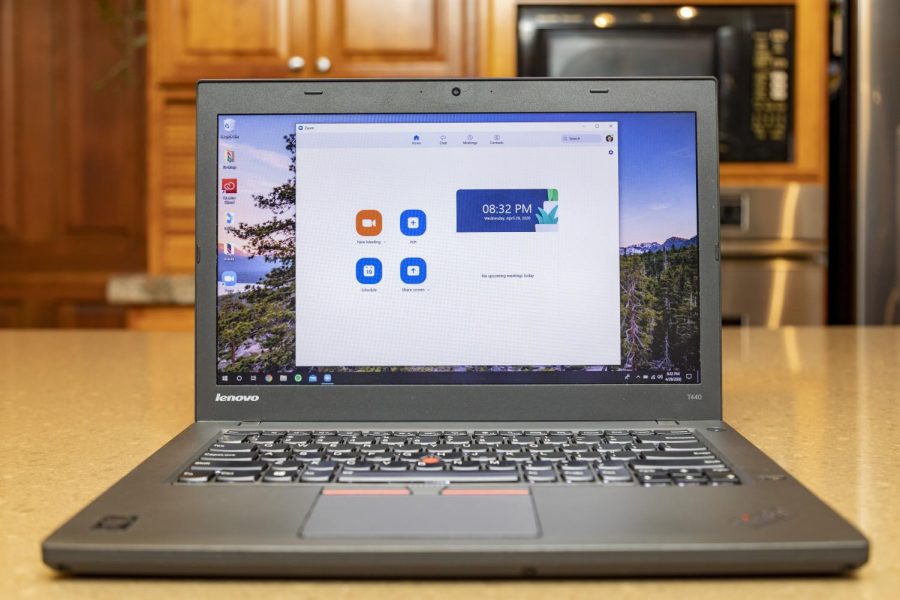Why We Shouldn’t Be Using Zoom
Zoom has a long history of security and privacy breaches.
April 29, 2020
As most of us know by now, Zoom, created by billionaire Eric Yuan, is an online communications platform that went from being nearly unheard of by some to becoming the default application for videoconferencing in the wake of the COVID-19 calamity.
The now-burgeoning pandemic happened quickly, and no one could have predicted it with a high level of certainty, and no one prepared for it apart from last-minute preparations. That’s why when the need for an easy-to-use, high capacity, and high-quality face-to-face online communication platform arose, the precedent was set hastily, and quite possibly recklessly.
Now, in the midst of this tragedy, it’s time to settle in and make careful decisions about how we choose to continue through the uncharted territory of nationwide online school.
And the first step? Follow the example of New York City’s public school system, where the application is banned, and stop using Zoom.
Despite the array of well-established options like Skype, FaceTime, or Hangouts, made by well-trusted corporations, we continue to use an underdeveloped platform that has blatant privacy issues that lead hackers to flock towards the opportunity and sell your information online for a profit, or given away for free.
Thankfully, Zoom’s privacy policy, which was once so lax that just about anything could have been sold to advertisers, has now been tightened against such abuse of data. Although this progress is promising, the morality of Zoom’s leadership now unarguably comes into question.
Setting aside the aforementioned blunders, Zoom not only had to remove code that automatically and without consent transferred device data to Facebook, but also misled users to believe there is end-to-end encryption (something that would prevent data being leaked to hackers), a service previously advertised on its website despite a Zoom spokesperson admitting that “it is not possible to enable E2E encryption for Zoom video meetings.”
As reported recently by The Intercept, “Zoom [was] using its own definition of the term, one that lets Zoom itself access unencrypted video and audio from meetings.”
Another example of Zoom’s questionable morals is their now-discontinued bypassing of Mac security measures, which installed a small web server without permission, potentially allowing hackers to view you through an onboard camera and hear you through your device’s microphone. Even if you removed the Zoom client app, Zoom’s web server would remain in place and continue to run. If you wished to join a Zoom meeting and clicked on a link, the server would secretly reinstall the Zoom client without your permission.
In addition to this, business partners like Dropbox discovered and alerted Zoom to these problems up to two years before the pandemic, but Zoom only rushed to fix them after a swath of new users joined and mainstream media coverage was making the problem clear to the public.
Fortunately, Zoom has made advances in protecting its users, adding an option called “security” that will help the hosts of any given meeting reject those “bombing” a Zoom call, or entering a call without permission and displaying inappropriate material, which would also help to protect sensitive data.
However, the rush to add new security features doesn’t necessarily seem intended to protect their users, but instead to save their image. Who is to say this won’t happen again?
Even if we, as a school, take steps to ensure data security and use the options available in our meetings to do so, it’s time for a conversation about which technological institutions we support when it comes down to casting our vote as consumers and leading the charge for positive, moral practices concerning data usage, honest advertising, and privacy.
Our choices as consumers matter in signaling what behavior is acceptable, and what practices won’t be tolerated in a world where so much can be lost in placing trust in the wrong companies and institutions.
Whether or not Zoom is convenient, easy to use, or capable of supporting 100 participants, it’s the responsibility of our community to protect our data security and privacy, and reject malpractice, technological or otherwise.






Gabriel El Youssef • May 17, 2020 at 10:50 pm
How am I just reading this article now? Absolutely brilliant. Speak the truth about nasty billionaire-owned corporations.
Santiago N. • Apr 30, 2020 at 6:49 pm
Great article with some hard needed truth. I never really liked Zoom to begin with. Google Hangouts is basically the same and more secure.
Nathaniel Alloway • Apr 30, 2020 at 4:28 pm
Thank you Andrew for covering the Zoom privacy and security news, very cool
Noah Banks • Apr 30, 2020 at 5:26 am
Thank you for writing this article, Andrew!
Gavin Sunderland • Apr 29, 2020 at 11:48 pm
Ok…so basically, Zoom is cringe, major league cringe